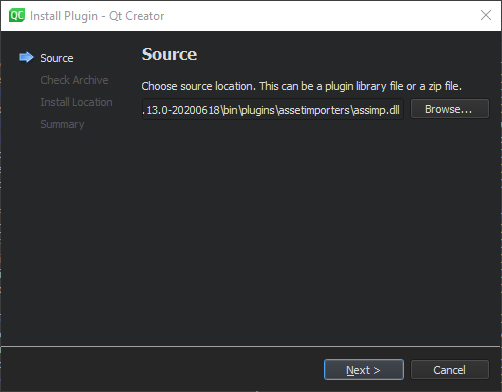

- #Qt creator refactoring plugin update
- #Qt creator refactoring plugin code
In Document update threshold, specify the amount of time Qt Creator waits before sending document changes to the server.You can set a fixed number of cores to use in Worker thread count. By default, clangd attempts to use all unused cores.Select Insert header files on completion to allow clangd to insert header files as part of symbol completion.

However, this increases the CPU load the first time you open the project. For more accurate results during global symbol searches, select Enable background indexing.In Path to executable, enter the path to clangd version 13, or later.Select Edit > Preferences > C++ > Clangd > Use clangd.The document outline in the Outline view is backed by clangd's document symbol support, which makes the results more reliable than before. For large projects, this can take a while, but the index is persistent and re-scanning is incremental, so nothing is lost by closing and re-starting Qt Creator.

When you open a project, clangd scans the source files to generate the index. The clangd index provides exact and complete results for services such as finding references, following symbols under cursor, and using the locator, even for complex constructs. To index all files, deselect the check box. To adjust the limit, edit the value for the Do not index files greater than check box.
To avoid out-of-memory crashes caused by indexing huge source files that are typically auto-generated by scripts or code, the size of files to index is limited to 5MB by default. To process precompiled headers, deselect the Ignore precompiled headers check box. #Qt creator refactoring plugin code
To instruct the code model to interpret ambiguous header files as C language files if you develop mainly using C, select the Interpret ambiguous headers as C headers check box. Select Edit > Preferences > C++ > Code Model. To configure the Clang code model globally: Clang tools (globally or at project level). Clang code model (globally or at project level). You can configure Clang diagnostics either globally or separately for: This setting also exists on the project level, so that you can have the clang-based services generally enabled, but switch them off for for certain projects, or vice versa. To use the built-in code model instead, select Edit > Preferences > C++ > clangd, and deselect the Use clangd check box. Currently, the following services are implemented: The Clang code model plugin now provides some of the services that were previously provided by the built-in C/C++ code model. But for larger projects that include several files, processing a single file and all the included files can take a while. For small projects that only use STL, this is relatively fast. Clang does not need to generate object files, but it still needs to parse and analyze the source files. On the downside, for large projects using Clang as code model is slower than using the built-in code model. We make use of these libraries via the clangd tool, which implements an LSP server.Ĭlang keeps up with the development of the C++ language. Clang focuses on detailed information for diagnostics, which is really useful if the code contains typos, for example. The feedback you get through warning and error markers is the same as a compiler will give you, not an incomplete set or a close approximation, as when using the built-in Qt Creator code model. The Clang project provides libraries for parsing C language family source files. Qt Creator comes with a plugin that provides some of these services for C++ on top of Clangd. Inspecting code by using the class browser, the outline, and so on. Navigating in the code by using the locator, following symbols, and so on. It is the framework that allows Qt Creator to provide the following services: The code model is the part of an IDE that understands the language you are using to write your application.







 0 kommentar(er)
0 kommentar(er)
